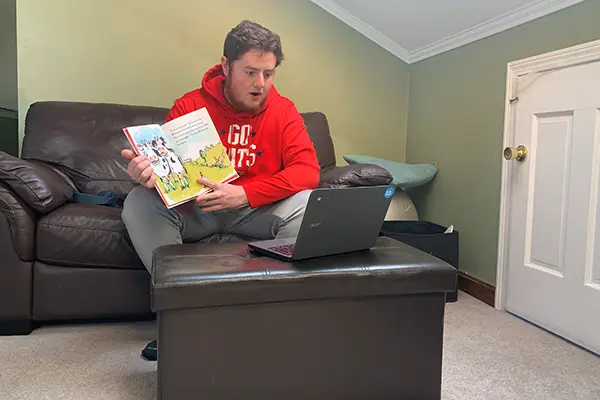Program Funded by Entrepreneur and Philanthropist Luis Pedroso
 Image by Courtesy
Image by Courtesy
03/05/2021
By Katharine Webster
When Luis Pedroso, who emigrated from Portugal as a child, was attending the Lowell Public Schools, he sometimes struggled with math homework.
“When I went home, I didn’t have anybody to help me with anything. I was on my own,” he says. “Math is really a foreign language, and unless you understand it, you’re not going to be able to do very well.”
Based on his own experience, Pedroso, president and co-founder of Accutronics Inc., is funding a program that employs UMass Lowell education students to assist in the Lowell public schools. It’s only the latest in his philanthropic efforts, which have benefited UMass Lowell, UMass Dartmouth, Middlesex Community College and Lowell High School, which he graduated from in 1980.
The Pedroso Tutors – undergraduate education majors and STEM majors with an education minor through the UTeach program – work with elementary school students as tutors, mentors and classroom support. About 10 UML students participate in the program each semester and are paid $15 an hour for their work, says Field Coordinator Lizzie Casanave.
 Image by Tory Wesnofske
Image by Tory Wesnofske
Senior Payal Patel, an honors biology major who’s in UTeach, is helping third- and fourth-graders with math at the STEM Academy now. She loves the chance to connect with the children.
“Working with the students really does brighten my mood,” she says. “They’re hilarious. It just makes my day.”
Patel assists in a different class each week, meeting in a Zoom breakout room with a small group of students who are struggling with a particular lesson and breaking it down for them, step by step.
She says she’s learning a lot about how to teach online. And, although she plans all of her lessons carefully in advance, she’s discovered the importance of having a back-up plan in case of technical issues or other challenges.
“You can plan a lesson second by second, but when you walk into a classroom or go on Zoom, everything can go wrong and you have to make a whole new lesson on the spot,” she says.
Junior education major Giana Vozella taught twice a week in person at Pawtucketville Memorial Elementary School when the Pedroso Tutors program started a year ago.
 Image by Courtesy
Image by Courtesy
“I got to work with so many different students and grade levels and learning levels, and with students from so many different cultural backgrounds,” she says.
Vozella is especially proud of helping to figure out the best way to assist two fourth-graders who were trying to catch up to grade level: have them work through problems on a whiteboard, instead of on paper or in their heads.
“It empowered them,” she says. “They actually begged me to give them homework every night.”
Vozella is now working online at the STEM Academy. A first-generation college student, she says she’s grateful to have paying work related to her educational goals.
Shailyn Ortiz, a junior education major, also tutored in person last winter and is working remotely at the STEM Academy now. While on site at the McAvinnue Elementary School, Ortiz mostly worked one-on-one with kindergarten and first-grade students – the grade levels she wants to teach – on their numbers and letters. She also assisted fourth-graders with reading and writing.
“I was able to see how different teachers taught, and pick apart the things that I like and might want to bring to my own teaching,” she says. “And I also saw the things that kids struggle with in the classroom, so I can be more aware when kids who have those issues show up in my classroom.”
 Image by Courtesy
Image by Courtesy
“I’m taking Elementary Math for Teaching right now, and it’s actually cool because I can use what I learn in that class to help the kids in math,” she says.
Declan Burke, a sophomore education major, recently began helping three fourth-graders in a single class at the STEM Academy. All three children benefit from individual attention in language arts, either because they are English language learners or because they have moderate disabilities.
Burke says that he works closely with the teacher to prepare the three students for new concepts and material before the whole class does a particular lesson.
“The goal is to keep everyone on the same, even playing field,” he says. “I work with the same core three students, but if another student is ill and misses a week or is falling behind on certain topics, the teacher will pull them in.”
He loves working with students in such a diverse classroom because it’s so different from his own school experiences in the predominantly white suburb of Westwood, Massachusetts. He’s especially grateful to get direct teaching experience at a time when undergraduate field experiences are necessarily limited by the pandemic.
“There’s a unit on lesson planning in every single education class we take,” he says. “Being able to apply that in the real world has been awesome for me.”
Pedroso sees another benefit in the program, too – especially for Lowell schoolchildren who come from immigrant families, like his.
“In any immigrant community, most of the folks think that college is only for the well-off, and there’s a stigma that you have to be really smart to go to college. You can’t just be a normal student,” he says.
“Exposing the grade school students to someone who’s already in higher education, they can see that, ‘This person isn’t that different from myself, so maybe I can do that, too.’”




